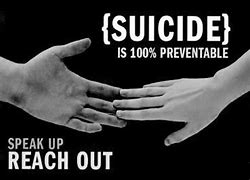by Anwuli Oseloka
Suicide is considered an intentional act of taking one’s own life. In recent years, it has become a global pandemic.
Many Nigerians were heartbroken when it was reported that the former CEO of Konga committed suicide on June 25th by jumping down his balcony in his Lekki apartment. His family have debunked the news, and we are yet to know the true cause of his death, suicide or not.
On 4th of July, a pregnant lady, whose name was withheld, was rescued by the Lagos police from committing suicide in Ikorodu area of Lagos. She claimed she was frustrated as the father of her unborn child rejected her and she was recently just defrauded in her POS business.
A 40-year-old EFCC operative known as John Obomeile Yamah recently committed suicide in Abuja as well and reports from his family is that burial arrangements will commence on Wednesday,10 July.
Last year, there were several suicide cases but one of the deaths by suicide cases that got media attention was Mrs. Toluige Olokoobi who became a media sensation after posting a video where her son whom she was reprimanding, asked her repeatedly to ‘calm down.’ It was reported by the Edo state Police command that Olokoobi reportedly took her own life in the presence of her one-year-old child, leaving behind three kids. Neighbours said she had been battling depression.
A total of 350 suicide reports were identified between January 2010 and December 2019. As at 2024, there are over 100 reported cases of suicide. With poor reporting mechanisms in place and unreliable data, the suicide numbers in Nigeria are certainly more.
According to Dr. Tedros Adhanom Ghebreyesus, Director-General of the World Health Organization, “We cannot – and must not – ignore suicide.”

Is Suicide a crime?
In Section 327 of the Criminal Code, a person will be charged with a felony and will be liable to life imprisonment if he or she aids, counsels, procures another to kill himself.
However, on February 15, 2022, the Nigerian House of Representatives made a strong move to replace the one-year jail term with community service and counselling as punishment for attempted suicide.
Factors Contributing to Suicide
Mental Health Issues
Mental health disorders, such as depression, anxiety, and bipolar disorder, are significant risk factors for suicide. The stigma associated with mental illness often prevents individuals from seeking help.
Cultural and Social Pressures
Individuals may face immense pressure to succeed academically, professionally, and socially. Failure to meet these expectations can lead to shame, guilt, and a sense of worthlessness.
Economic Stress
Economic factors such as financial pressures, unemployment, and job insecurity can lead to feelings of hopelessness and despair can also lead to suicide.
Suicide has a profound impact on families, communities, and society as a whole. The loss of a loved one to suicide leaves a lasting emotional scar on family members and friends, leading to grief, trauma, and even mental health issues among the bereaved.
Adetayo Oki, a lawyer believes even though attempting suicide is a criminal offence in Nigeria, under Section 327 of the Criminal Code Act, “What suicidal people really need is effective treatment, counselling, and assistance, not really punishment.”
Oluwaseun Ashaye, a teacher suggests addressing the economic factors contributing to suicide involves creating job opportunities, providing financial assistance, and implementing social safety nets for vulnerable populations.
Today, a large number of people are depressed, and still do not know how or where to seek help. It is time to step up public health campaigns, educational programs, and community outreach to inform the public about the signs of mental health issues, and the importance of seeking help to reduce suicides.








